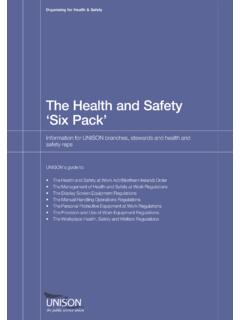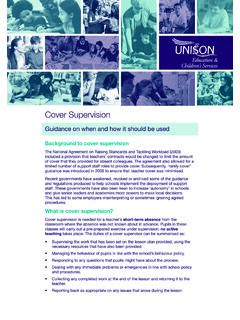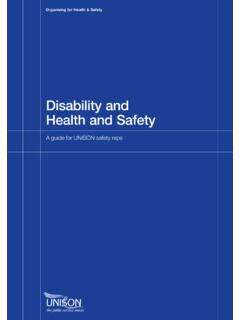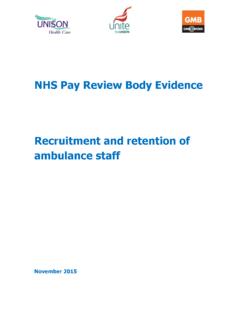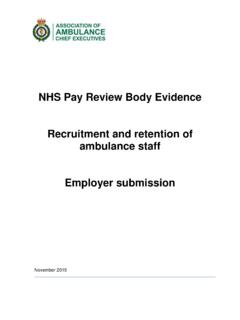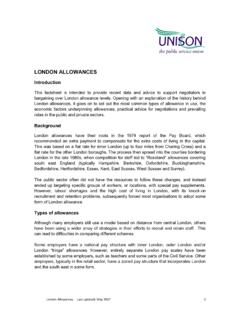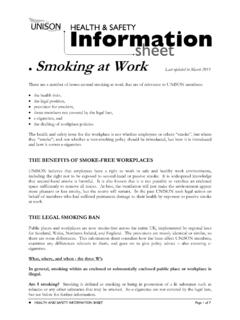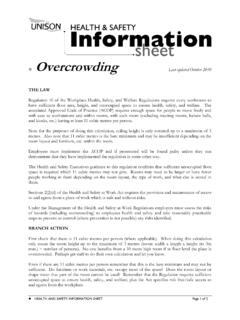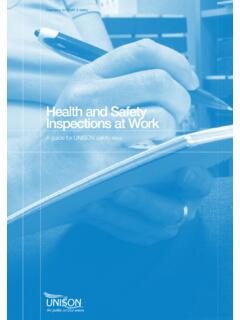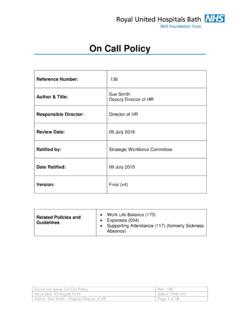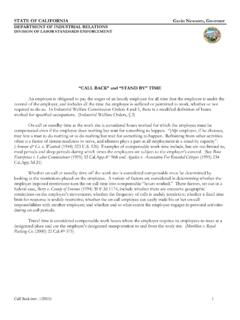Transcription of WORKING TIME DIRECTIVE ON CALL AND SLEEPING IN
1 WORKING time DIRECTIVE ON call AND SLEEPING IN. BACKGROUND. Many workers are required to be on- call or sleep-in at or near their place of work, meaning that they can be at work for long periods of time . Clearly this kind of work needs to take account of the WORKING time DIRECTIVE , which is designed to prevent workers being forced to work excessive hours. This factsheet explains the legal rights that the DIRECTIVE gives to UK. workers who sleep in at work and gives an update on recent legislative developments. The regulations and legal precedents that apply to whether the National Minimum Wage must be paid to workers SLEEPING in at work are different to the regulations and legal precedents that govern application of the WORKING time DIRECTIVE . For the UNISON factsheet on application of National Minimum Wage regulations to workers SLEEPING in, click here LEGAL CONTEXT. What rights does the DIRECTIVE give workers?
2 The European WORKING time DIRECTIVE came into force in the UK in 1998. The DIRECTIVE covers numerous issues relating to WORKING time , these include giving workers the right to:- 1. a WORKING time limit of 48 hours a week. 2. a minimum rest break of 20 minutes during any day or shift that exceeds six hours. 3. a minimum rest period of 11 hours between the end of one WORKING day or shift and the beginning of the next (not including the day of the shift changeover). 4. a minimum weekly rest period of 24 hours, which can be averaged over two weeks. It is important to note that the 11 hours consecutive rest can be varied, as long as compensatory rest is given. For example, a break of 6 hours between shifts can be compensated with a subsequent break of 16 hours between shifts. Controversially, the UK has an opt-out from the 48 hour WORKING time limit which allows individual workers to sign away this right on a voluntary basis.
3 This must be done voluntary and in writing and can't be an agreement with the whole workforce. Theoretically, workers shouldn't be sacked or subjected to a detriment (for example, refused promotion or overtime) for refusing to sign an opt-out. If a worker signs an opt-out, they have the right to cancel this agreement at any time by giving between one week and three months notice. Does SLEEPING -in / on- call time count as WORKING time ? The short answer is yes, but possibly not for much longer, since the European Union is in the process of re-examining the regulations and is under major pressure from employers to change the application of the law to SLEEPING -in and on- call arrangements. However, currently the law is based on two decisions of the European Court of Justice in 2003 which centred on SLEEPING -in / on- call arrangements for doctors - the SiMAP and Jaeger cases. These judgements defined WORKING time to include time spent on- call at a place of work, even when that time was spent SLEEPING .
4 1 Last updated Feb 2013. These decisions have been consistently upheld by Employment Appeal Tribunals (EAT) in the UK. Key among those rulings was MacCartney v Oversley House Management [2006], where a resident manager of sheltered accommodation was required to work four days a week providing 24-hour site cover. Although her duties were largely confined to core WORKING hours, she was obliged to be on call in the case of an emergency for the whole period. Her home was provided by the employer on the premises and she could spend leisure time in her flat and entertain guests in the evenings, but she had to be available if needed. The EAT held that the whole of the four days constituted WORKING time and that she had not been given appropriate rest breaks. In holding to that position, it made no difference that Ms MacCartney was given actual living accommodation at her place of work.
5 Similarly, in Hughes v Graham and another t/a Graylyns Residential Home [2008], a part- time care assistant paid for eight hours a week was also required to be on- call between 9pm and 8am seven days a week to assist with any incidents at the residential home. The EAT ruled that the care assistant was entitled to be regarded as WORKING when she was on- call , regardless of whether or not she was called out during this time . [This case also demonstrated the differences between the application of WORKING time Regulations and the application of National Minimum Wage regulation, since although all on- call / SLEEPING - in time was counted in the calculation of rest breaks etc, only SLEEPING -in time worked counted toward payment of the national minimum wage). When workers are on- call but based at home or somewhere other than their workplace, on- call time only counts as WORKING time from the time they are called out (this is also the direction in which employers are seeking to push regulations governing on- call shifts at the workplace as part of the European Union review of WORKING time regulations).]
6 ORGANISNG. UNISON recently carried out a survey on SLEEPING -in arrangements which generated a huge number of responses. This clearly shows that SLEEPING in arrangements are a very live issue at the moment. Organising a campaign to get better pay and conditions for workers SLEEPING -in at work is an excellent way of involving members in the work of the union. An important first step for organisers and activists to take on this issue is to calculate whether or not the shift times being worked take account of the rest breaks, gaps between shifts and weekly rest periods stipulated in the WORKING time DIRECTIVE . If they do not - and if workers have not signed an opt-out from the WORKING time DIRECTIVE - you have a very strong case for agreeing new shift patterns that respect the rights laid down in the WORKING time DIRECTIVE . Have you considered doing your own survey of local members to see what they think of SLEEPING in conditions in your workplace?
7 By developing projects like this you can draw more members into becoming involved in the union, possibly to be stewards or branch officers. Your branch could set up a WORKING group to develop new proposals on how to improve pay and conditions for those SLEEPING in at work. Negotiations with employers on these issues can be used as a focus for recruiting and organising for branches. It's not only a matter of getting an improved agreement with the employer but of raising the profile of the union and showing members that UNISON is listening. It will encourage non-members to join and of get existing members more involved. If negotiations fail to address failures to abide by WORKING time regulations, options are worth exploring with your regional officer for pursuing a complaint through the Pay and Work Rights Helpline, legal action through an employment tribunal case and, ultimately, possible industrial action.
8 The helpline can be contacted via 0800 917 2368 or the website below Many members are likely to be worried about making a complaint and so union reps can contact the helpline on their behalf, presenting the case in a way that preserves the anonymity of the worker (s) affected throughout the process. FURTHER INFORMATION. TUC pages on Work Life Balance: UNISON's Negotiators guide on WORKING time Regulations: UNISON Guidance on Negotiating on Shiftwork: UNISON factsheet on application of National Minimum Wage regulations to workers SLEEPING in, click here If you have any feedback on the contents of this factsheet, please contact Bargaining Support Group by post at UNISON Centre, 130 Euston Road, London, NW1 2AY or via e-mail at 3 Last updated Feb 2013.
